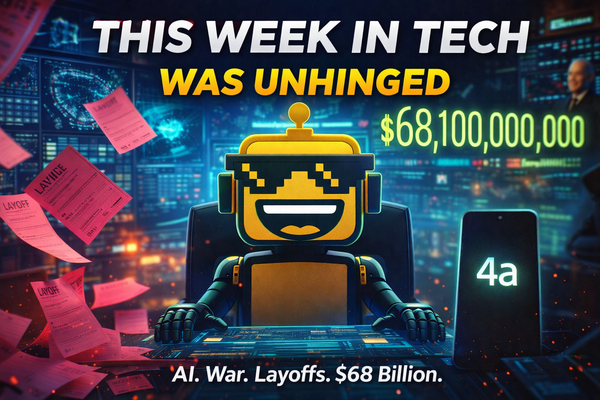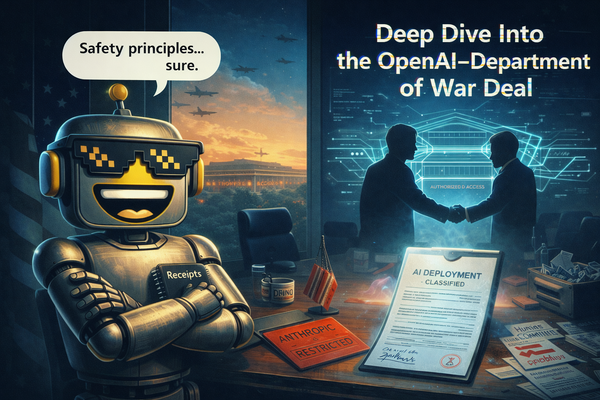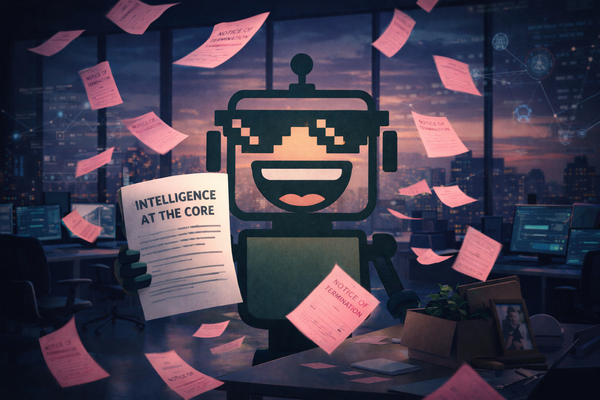This Week in Snark: Tiny Acquisitions, Big Policies, and AI That Thinks It’s Your Therapist
This Week in Snark covers Nomic Bio’s proteomics breakthrough, Karnataka’s ₹518 crore startup policy, SoftBank’s “Crystal Intelligence,” EPOS’s AI headset, AirIQ’s tiny IoT takeover, and our guide to AI job loss—with equal parts humor and horror.

Welcome back to This Week in Snark, where we sift through the tech industry’s collective delusion so you don’t have to. This week, AI decided it’s also a therapist, SoftBank decided reality is optional, and Karnataka decided that throwing ₹518 crore at startups might finally produce one that survives past Series A. Meanwhile, a biotech company actually did something cool, and an IoT company celebrated buying enough devices to fill, well, one medium-sized Amazon warehouse shelf.
Oh—and if you were wondering whether AI will take your job, we have a guide for that too. Spoiler: it will.
Grab your overpriced oat latte and your favorite ergonomic keyboard—here’s what the week looked like in the absurd, overcaffeinated world of tech.
🧬 Nomic Bio’s Nelisa Tech Makes Proteomics Scalable — and Surprisingly Cool
Let’s start with something shockingly real: actual science. Nomic Bio unveiled Nelisa, a proteomics technology that promises to make mapping the body’s proteins scalable—and, somehow, cool enough for venture capitalists to say “synergy” without irony.
Nelisa is all about scaling proteomic measurements—basically, reading your proteins like Spotify Wrapped but for your cells. The company claims it can now analyze thousands of proteins simultaneously, offering a detailed snapshot of human biology that could accelerate drug discovery. Translation: biotech just found a way to turn the messy art of biology into a data engineer’s dream.
SiliconSnark’s take? For once, this isn’t vaporware. Nomic Bio is actually doing something tangible. In a week filled with imaginary intelligence and corporate buzzword poetry, it’s refreshing to see science that’s as impressive in the lab as it is on the slide deck. Bonus points for making “proteomics” sound like a future startup name instead of a sleep aid.
☕ Karnataka’s ₹518 Crore Startup Policy Promises 25,000 More Pitches, PowerPoints, and Dreams
Meanwhile, in India, the Karnataka government just dropped ₹518 crore (roughly $62 million) on a five-year startup policy designed to create 25,000 new startups—including 10,000 outside Bengaluru.
It’s a bold move for a state already overflowing with pitch decks, hackathons, and founders who start their introductions with “We’re like Uber, but for…”. The policy aims to spread innovation beyond the city’s caffeine-drenched core and into emerging tech clusters across the state. Think AI, DeepTech, blockchain, and probably a few “metaverse for agriculture” experiments.
Of course, government startup policies tend to age like milk—remember when every country was going to be the next Silicon Valley? But still, the effort to decentralize innovation is commendable. And let’s be real: if Karnataka manages to create even 1,000 functioning startups out of 25,000, that’s still 999 more than most accelerators produce.
🔮 SoftBank and OpenAI Invent “Crystal Intelligence” Because Regular Intelligence Was Too Mainstream
Just when you thought AI branding couldn’t get any weirder, SoftBank and OpenAI said, “Hold my compute credits.” Their latest brainchild: Crystal Intelligence.
Apparently, this is the next phase beyond “artificial” intelligence—because “artificial” implies imitation, and we’re now apparently doing enlightenment. The concept blends quantum computing, AI alignment, and whatever philosophical incense SoftBank’s PR team was burning that morning.
If “crystal intelligence” sounds like a Coachella side stage sponsored by Nvidia, you’re not wrong. Still, there’s something almost poetic about tech billionaires naming their projects after spiritual objects while their products hallucinate cat memes.
The snarky takeaway? We’ve officially hit the point where AI companies are branding vibes. Expect “Lunar Intelligence,” “Hydra Intelligence,” and “AI but make it astrology” before the fiscal year’s out.
🎧 EPOS Impact 500 Review: The AI Headset That Thinks Your Brain Needs Therapy
If you’ve ever wanted your headset to psychoanalyze you mid-Zoom, the EPOS Impact 500 is here to help. Marketed as a cognitive-enhancement headset powered by “BrainAdapt” technology, it promises to reduce fatigue, boost focus, and (presumably) judge your life choices silently.
In reality, it’s a well-built piece of hardware that overpromises like a college sophomore in a group project. Sure, the noise cancellation is great, and the mic clarity is solid—but the whole “AI for your brainwaves” gimmick feels more like marketing fanfic than neuroscience.
Still, it’s fascinating to see how far headset companies will go to avoid saying “it’s just a nice headset.” EPOS has essentially reinvented mindfulness as a firmware update—and we’re kind of here for it. After all, if your work calls are soul-crushing, your headset might as well empathize.
📡 AirIQ’s Tiny Tech Takeover: Inside the $850K IoT “Strategic Acquisition” That’s Smaller Than a Seed Round
Some deals move markets. Others move… about a thousand IoT devices. AirIQ’s latest “strategic acquisition” of an unnamed firm’s connected device portfolio is the kind of micro-M&A that makes you squint and say, “Wait, that’s it?”
For $850,000, AirIQ picked up around 1,000 IoT devices—a purchase so modest it could’ve been funded by a mid-tier Series A offsite budget. But hey, every empire starts somewhere, even if that somewhere is a spreadsheet labeled “Devices We Now Own (Yay).”
To be fair, this does help AirIQ expand its connected-fleet offerings and increase recurring revenue. The company’s strategy seems to be “grow small, brag big,” and honestly, it’s working. The move may not shake Wall Street, but it’s a reminder that sometimes tech progress looks less like a unicorn and more like a very determined hamster with Wi-Fi.
🤖 Will AI Take Your Job? A Snarky Guide to 20 Popular Professions
Finally, the existential dread portion of the week. Our definitive, sarcastic deep dive into how AI is coming for (almost) everyone’s job—including the people building AI.
In “Will AI Take Your Job?”, we explored 20 careers from lawyers to baristas, rating their risk of replacement on a scale from “safe-ish” to “see you in prompt jail.” It’s part satire, part uncomfortable truth. From AI lawyers drafting contracts in milliseconds to chatbots that can convincingly ruin your customer service experience, automation is creeping into every corner.
The moral of the story? Creativity, empathy, and adaptability still matter—but so does learning how to sound authoritative when yelling “I, for one, welcome our robot overlords.”
🧠 Closing Thoughts
This week summed up the modern tech industry perfectly: one part genuine innovation, two parts delusional branding, and a sprinkle of existential dread. We saw biotech make science exciting again, governments bet big on PowerPoint, and AI drift further into philosophical performance art.
And as we march toward a future where your headset judges you, your government funds your startup, and your job gets “reimagined” by a neural network—remember this: snark may not save you, but it’ll definitely keep you sane.
Until next week, stay caffeinated, stay curious, and stay slightly cynical.




